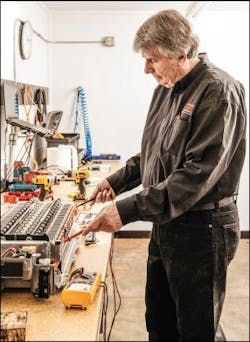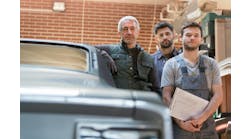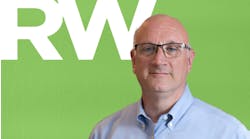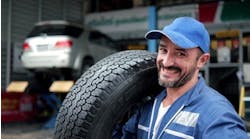How much does it cost to acquire a customer for your business?
That’s the start of Rich Hoffman’s explanation.
“And what’s a good, loyal customer worth to you?” he continues. “Bottom line is that we need to put ourselves in a category above anybody else in our market. We’re all fighting for market share, and if you can differentiate yourself from others—despite the investment—it will benefit you long-term.”
Hoffman and his team at Hoffman Tire Pros in Fayetteville, Ga., are testing that notion after joining forces in early 2014 with The Hybrid Shop, a growing national network of independent repair shops trained, equipped and marketed for hybrid and electric vehicle services.
The Hybrid Shop operates with a franchise model: Repair businesses pay a fee to join the network as an official The Hybrid Shop “dealer” location (the company’s term for a shop partner), and are given a turnkey program that includes everything needed to create an additional business segment focused on alternative-fueled vehicles (AFVs). They are promoted through The Hybrid Shop’s own marketing, and are given an exclusive territory to avoid multiple shops competing against each other.
Hoffman Tire Pros, located just outside of Atlanta, is one of 38 shops in the network—a number that has tripled in the last year. Hybrid and electric vehicle production is on a steady rise, and more and more AFVs are making their way to independent shops.
The investment can be steep, but according to shop owners like Hoffman, the returns can go beyond the increased revenue.
Ratchet+Wrench spoke with three shop owners in three separate regions to examine the results they’ve seen since joining The Hybrid Shop’s program.
WESTCOAST
BACKSTORY
It’s difficult to make money with a gas station. Dave Carney knows; he used to own five of them. After nearly 20 years of scraping by on low margins, Carney decided to pivot his business model, turning one of his locations into a full-service repair center, selling off two other stations, and focusing on growing a real brand as a general service shop.
That was the birth of Hillside Auto Repair—small at just three bays operating out of 800 square feet of shop space, but on a busy thoroughfare in an affluent area of Southern California. Business grew quickly since the transition in 2002, and Carney has worked to get the most out of every inch of shop space.
“It’s all about creating efficiencies,” he says. “That’s in everything we do. We want to add value to our customer. We have a lot of high-end customers, and our focus, our mantra is exceptional customer service for every customer.”
THE DECISION
The Hybrid Shop provides demographic research to potential partner shops of the number of hybrid and electric vehicles in the shop’s immediate market. For Carney, he had 25,000 within 6 miles, more than 100,000 within 10 miles.
“There were Priuses everywhere in our market,” he says, noting he already had about 85 hybrids in his shop’s database. “It was a no-brainer.”
The program includes a franchise fee of $60,000 that covers training, marketing and the company’s patented battery reconditioning equipment.
Carney signed up in March of 2014, and put all five of his technicians through the training on staggered intervals over the course of the next three months. The training is a comprehensive, four-and-a-half-day, hands-on course at Automotive Research and Design's training facility near Madison, Wis. By June, each tech had completed the course.
Additionally, Carney added an outdoor lift to his shop, which he says was pretty much humming at capacity prior to this move. In all, it was an $80,000 investment, including man hours lost during training periods.
THE RESULTS
Carney’s shop has a typical average repair order (ARO) of roughly $525 on traditional work. ARO for hybrid repairs is just above $2,000, and almost every job comes from work he otherwise would not have had.
The majority of that work comes from battery reconditioning, which ranges from $1,300 to $2,000 depending on the vehicle. And because it requires little more than plugging the battery into the equipment, Carney says those jobs have an 80 percent gross profit. (There is a per-vehicle fee each time the reconditioning equipment is used; for Priuses, it is $125.)
“We probably get four or five Priuses in the shop per week now,” he says. “Those are easily the most common. Then you get others that trickle in as well.”
But Carney believes the workload isn’t anywhere near where it will be. He began an extensive marketing campaign in August that includes direct mail, SEO and Internet marketing, and what he called “a guerrilla marketing tactic,” in which he and his staff carry 5-inch by 5-inch promotional cards with them everywhere and place them on the windshield of every hybrid they see.
Despite the steep investment, Carney says it will take roughly 12 months to recoup all costs, based on his projections, and it should lead to a significant revenue increase in 2015.
THE TAKEAWAY
Customer attrition is a constant in the industry, Carney says. No matter how good your shop is, you will always have some customers that don’t come back.
Just a simple ARO comparison demonstrates the value of hybrid customers, and how they can quickly make up for any customer attrition.
“These are high-end customers, and expensive repairs,” he says. “And this is the future of vehicles. We’ve established ourselves early. We’re the experts, and people will recognize that.”
FACT SHEET
Program Features: Participating shops go through an application process. When approved, they receive branding materials (both physical and online), marketing assistance (search engine optimization being a major focus), hands-on training, battery reconditioning equipment, networking opportunities with other shops in the program, and around-the-clock technical assistance from the technical team at Automotive Research & Design (AR&D).
The Technology: The battery reconditioning equipment is a unique, patented tool designed by AR&D and used by The Hybrid Shop franchisees. A technician hooks up the equipment to a battery, and can leave it unattended while the equipment recharges the battery’s cells.
The Investment: $60,000 franchise fee (additional costs can reach $10,000 for extra equipment, marketing and expenses for travel and technician lost hours for training).
Average Repair Order: $2,000
Maintenance Still a Need: Although battery reconditioning is a primary focus of the program, all hybrid vehicles still require basic maintenance needs. ARO can increase substantially based on keeping customers on a regular service schedule.
Recondition vs. Replace: A replacement battery for a Prius can run anywhere from $1,200–$3,500, depending on if its new or refurbished. That does not include installation and labor from a shop. The Hybrid Shop partner facilities interviewed charge anywhere between $1,300–$1,600 to recondition batteries with an 80 percent gross profit. The cost benefits the shop and customer, the shop owners say.
MIDWEST
BACKSTORY
Steve Clausen has a secret for winning market share: Be better than your competitors. It’s as simple as that, he says.
When he left a Madison, Wis., dealership to start his own shop more than 40 years ago, Clausen was an expert in the latest trend in repair work—emission control and carburetor work.
“I built a customer base just off that,” he says. “Everyone looked at me as an expert, and the business grew quickly.”
Over the years, and as vehicles improved, Clausen has always looked for ways to differentiate his business from others. He’s a NAPA AutoCare Center, AAA-approved, and does training through Auto Profit Masters.
“You always need an edge—some advantage that makes it a clear decision for the customer to choose you,” he says.
THE DECISION
After first hearing of The Hybrid Shop, Clausen began doing research of his own.
“I kept having conversations with them, with other shops doing it already, whoever I could,” Clausen says. “It’s hard because no one was doing it for four or five years that could give a clear picture.
“To do it, I had to be an early adopter. But that also meant I had the opportunity capture my market.”
The numbers helped, too: There were 9,000 hybrid vehicles in a 10-mile radius from his shop at that time (January 2014), and Madison was home to the largest dealer of Priuses in the state.
“I’d always see them but didn’t know squat about them,” he says. “Turns out, not many people do.”
Seeing a clear opportunity to corner a market, he bought in. In addition to the franchise fee, Clausen estimates he paid an additional $10,000 in extra equipment, as well as travel and time-lost costs associated with training himself and all three of his techs.
THE RESULTS
Clausen says there was a learning curve for his shop. The vehicles are very different—not more difficult, he says, just different. And each make and model can present unique challenges.
His shop had never done any major work on one before, and he estimates it took his team between six and nine months (including the training period) to “feel completely comfortable” with every hybrid that came in.
That being said, they did come in—often.
Priuses are the most common, but Clausen has seen vehicles from Honda, Ford and Chevy. He’s had customers bring vehicles from Minneapolis and Chicago. His average sales vary depending on the vehicle. ARO on a Prius he says is near $1,500 in his shop, but for a Ford Escape, it’s just above $2,500. Overall ARO on hybrid work is approaching $2,000.
Speaking in December, Clausen says his shop had nearly broken even on the investment, even though he feels the shop is “just getting started” in terms of its marketing push.
THE TAKEAWAY
The transition has had intangible effects as well, such as improving technician morale by challenging the team to become experts in an advanced field, allowing Clausen to network with other The Hybrid Shop franchisees, and has brought in more high-end customers. (It also led to a hire, Clausen says, as a tech sought out his business based on its new hybrid services.)
“The biggest thing, though, is that it gives us an edge,” he says. “With CAFE standards, this work will only grow—even if it grows slowly. We’re in on the ground floor of this, and we’ll be the ones established and able to benefit from it.”
SOUTH
BACKSTORY
Running a business is a game of adjustments, Hoffman says. His business, Hoffman Tire Pros, is a prime example of how to win that game.
The shop used to be focused on tire sales, but has slowly shifted its business model over the years. It now has a 65-35 split in work from mechanical to tires, respectively.
“Figuring out how to stay successful with tires as part of your business can be tricky,” he says. “We’ve always tweaked our business model based on the market and based on what’s coming down the road.
“The only way to stay in business for a long time is to not be the same business for all that time. You can’t be complacent, or you won’t stick around.”
THE DECISION
Hoffman is always looking for opportunities to expand his shop’s services, but hybrid repair seemed like a gimmick to him until reading an article on The Hybrid Shop in Ratchet+Wrench.
Curious, he decided to do his own research. He looked up the program, found all of its participating shops, and called each one of them to inquire about the program.
“I was pretty excited about what I heard—there were a lot of positives,” he says.
Then he called The Hybrid Shop, and got some hard numbers on his market. In March of 2014, there were 1,202 hybrids in his county, Hoffman says. But there were no other shops in his region; his “protected market” would include more than 5,000 hybrids.
“If I got just 10 percent of the customers in my county, that’s 120 customers,” he says. “And those are customers with expensive tickets, multiple vehicles.
“I looked at the cost of entry, the amount of equipment and training, and it all comes down to that question: How much does it cost to acquire a customer for you business?”
THE RESULTS
In addition to the franchise fee, Hoffman estimates he spent another $20,000 on additional hybrid-related equipment, travel and lost time for training, and a broken-down Prius. His team used the vehicle to practice, and after he put a wrap on it with Hoffman Tire Pros and The Hybrid Shop logos, he turned it into a driving billboard for the business.
He also built a separate room in the shop for the reconditioning equipment. He says the space wasn’t necessary to complete the jobs, but acts as a showroom for explaining the process to customers.
Even with those extra costs, Hoffman says he will break even at the 12-month mark of starting the program (March of 2015). ARO on hybrid work is over $2,000, and he feels it could reach $3,000 by better educating customers on the other maintenance needs of the vehicles.
The shop did $20,000 in hybrid work in the first six months, and Hoffman estimates it will top $100,000 over the first 12 months.
“And that’s all additional work I didn’t have before,” he says.
THE TAKEAWAY
This isn’t a niche for everyone, Hoffman points out. You need market availability—both in terms of vehicles and competition. Still, it’s something every shop should keep an eye on.
“Let’s face it, hybrids aren’t going away,” he says. “There may be different variations and changes down the road, but if you’re not starting now, you’re behind.”
“We’re giving customers an option they didn’t have before,” he says. “Customers are adjusting to this future [of vehicles], and we need to adjust to.”



